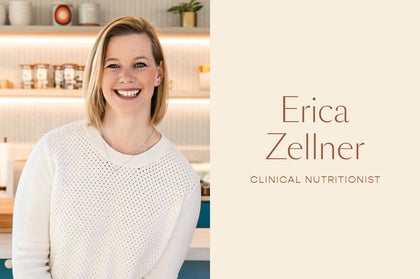As a clinical nutritionist, I focus on wellness from the inside out. The health of your hair is a great indicator of your overall health because hair is one of the most metabolically active parts of our body. To explain, your hair needs a constant supply of protein and nutrients to continue to grow — and grow well. And if your nutritional needs aren’t being met, your tresses will certainly reflect the deficiencies.
With your nutrition in mind, these are the foods I always have in my own pantry for healthy, shiny, strong hair. Plus, what supplements you should really be using to encourage thicker, fuller, longer-looking hair.
Must-Have Pantry Items for Healthy Hair
Here are the items I keep stocked up in my pantry at all times to ensure my hair gets the nutrients it needs:
Canned Beans (All Varieties)
Key nutrients: Iron and protein
Iron deficiency is a very common condition, affecting more than 3 million Americans annually. No matter what type of canned beans you prefer, you’ll receive the benefits of iron and protein in each serving.
Your hair follicles and roots rely on the blood vessels in your scalp to deliver oxygen and nutrients. And if your diet is lacking iron, those nutrients may not make it to your hair, which can result in hair loss. For people who menstruate, iron intake is even more crucial, as you will lose additional iron each month with your cycle.
Protein is also crucial for healthy and vibrant hair. Did you know that most of our hair is actually made of protein? When we don’t eat enough, our body reroutes the protein we do eat to our organs while ignoring non-essential functions like hair growth. And while this defense mechanism keeps us alive, it will also impact our hair growth, vibrance and strength.
#include-related-slider#
Pumpkin Seeds
Key Nutrient: Zinc
Pumpkin seeds are loaded with nutrients, including zinc. Zinc is a key mineral that plays many important roles in our body (like supporting the immune system, wound healing and supporting skin). Zinc also supports the production of sebum—aka the oil that protects your hair from moisture loss— at the base of the hair follicle. A lack of zinc has also been associated with hair loss.
Flax Seeds
Key Nutrient: Omega-3 fatty acids and vitamin E
I could speak for days about the importance of omega-3 fatty acids, and flax seeds are a terrific source! Omega 3’s can reduce inflammation in the body. Chronic inflammation in your body is linked to thinning hair, reduced hair volume and shrinking of the hair follicle.
Omega-3’s come in three forms: EPH, DHA and ALA. Our body uses EPA and DHA for most of its internal processes, while ALA must be converted into EPA or DHA. EPA and DHA are mostly found in animal sources, and ALA is mostly found in plant sources (think walnuts, flax seeds, or algae). In that conversion process, a significant portion of the omega-3s are lost, so it’s incredibly important for plant-based eaters to consume foods rich in omega 3’s regularly or consider supplementing if you’re not able to eat these foods regularly.
It’s important to know that the body can’t break down whole flax seeds. So to get all the nutritional goodness, you’ll need to grind them first. If you’re adding them to a smoothie, the blender will do this for you. Otherwise, you can purchase pre-ground flax seeds or grind them in a spice grinder before using them.
Shop: Best-Selling Hair Products for Thicker, Fuller Hair
Lentils
Key Nutrient: Biotin
Lentils are a power-legume for your hair. They are a great source of protein, and they’re rich in hair-strengthening vitamins like iron, zinc and biotin. Since biotin is a water-soluble vitamin, it can be damaged by aggressive cooking methods, so consider simmering lentils on low heat instead of pressure cooking or other high-heat methods.
Biotin is also necessary for keratin production, which is a foundational component of hair, skin and nails. Thanks to this foundational support, biotin is a common supplement recommendation for hair wellness. One such supplement is GRO Biotin Gummies, which contain the full daily value of biotin, plus a host of other hair-healthy vitamins and minerals.
Sweet Potatoes
Key Nutrient: Beta carotene
Sweet potatoes are a fantastic source of beta-carotene, a precursor to vitamin A. Every cell in our body needs vitamin A for growth, and this is especially important with our quickly-dividing hair cells! Vitamin A supports sebum production to moisturize, nourish and protect our hair from breakage.
Vitamin A is a fat-soluble vitamin, so when you’re eating sweet potatoes, make sure you have a healthy fat source in the same meal. This will increase your body’s ability to absorb and use it. I personally love a drizzle of hazelnut butter on a sweet potato with a dash of cinnamon!
Your Diet and Your Hair
You may be wondering how often you’ll need to work these foods into your diet to optimize your hair wellness. There’s no one-size-fits-all approach to nutrition and health; however, individuals with more nutrient variety and diversity in their diet tend to be healthier overall. Consider intentionally adding these foods throughout your week when it makes sense.
Add some pumpkin seeds to your salad to provide a satisfying crunch or meal-prep a bean and root veggie chili to eat throughout the week. By focusing on creating variety in your diet, you’ll automatically increase your nutrition and promote holistic hair wellness!
#include-related-slider#
More From VEGAMOUR
- 3 Ways Nutrition Impacts Hair
- 4 Food Choices Affecting Your Hair Health
- 5 Nutrients Your Hair Craves
- These Lifestyle & Nutrition Choices Could Reduce Stress



















